(Note: This article has been edited for clarity)
NATO is “obsolete.” The European Union will, and perhaps should, lose more members.
Such are the words of the president-elect of the United States, and they are unequivocally terrible.
When Trump slams NATO, he is quietly whispering to deadened nightmares Europe thought it had laid to rest. When he hopes for the EU to dissolve, he is literally trying to roll back civilization.
That’s not hyperbole. Here’s why.
NATO is the biggest reason we haven’t had World War III.
That is no exaggeration. When NATO was formed in 1949, it defanged West Germany, the industrial heartland of the former Reich. West Germany began a transformation from a geopolitically insecure upstart to a compliant ally of the U.S. world order.
For the first time in human civilization, the Franco-German border was secure. Consider the wars over that turf: the world wars, the Franco-Prussian war, the Napoleonic Wars, the wars of Louis XIV, the wars of the Roman frontier, and even the Celtic-Germanic tribal wars from before Caesar’s conquest. They were all rooted in who would dominate the Rhineland and its prosperous lands and waterways. It was long feared in both Germany and France that he who controlled the Rhineland controlled both France and Germany.
But once brought into NATO, neither could start a war with the other. It was quietly understood that the Americans, still based in Germany under NATO’s guise, would move to smash any aggressor that sought war within the alliance itself.
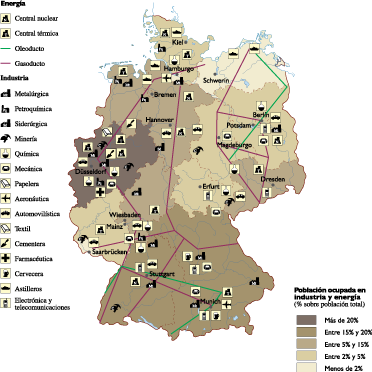
With France and Germany finally stilled, Great Britain, always fearful of a united Europe, could finally ease off, and eventually abandon, its long tradition of playing continental powers off against one another. Yet another great power’s existential fears had been eased, making it a more peaceful and reasonable power on the map.
Thus three of the most violent and important great powers of Europe no longer had reason to murder one another. In the achievements of human history, peace between these arch-rivals should rank near the top.
Meanwhile, if NATO was designed to stifle the motives for war, the EU was meant to kill the means.
The European Coal and Steel Community was founded in 1952 with the explicit goal of solving the Rhineland problem. If France and Germany could both benefit from the Rhine, there would be no reason to fight over it. The ECSC also included other Rhineland-dependent states like Belgium, Luxembourg, and the Netherlands. By pooling the industrial output of the Rhineland between them, a major source of geopolitical friction was solved.
This was the progenitor of the European Union. It was trying to solve a simple problem: European powers had spent centuries killing one another over economic interest. Europe’s murderous mercantilism had driven the continent to bigger and bigger empires. These empires made Europe develop faster and faster, creating more and more powerful and lethal states that dragged whole continents into their conflicts.
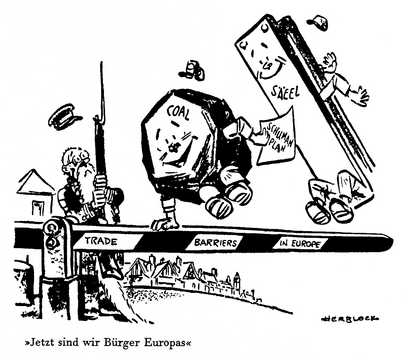
The ECSC began that long road towards economic integration that brought the continent together rather than drove dreadful competition. The EU was the same idea, and the euro was meant to anchor the continent so firmly in a common market that it would be far too painful for any one state to withdraw. To raise funds for a war would mean to borrow in euros, and which bank would lend to state gearing up to attack its fellow euro users?
So why do Trump’s comments matter? Can’t a man speak his mind?
The president-elect of the United States is basically telling Europe to rearm itself. That is a no good, very bad, outright horrible idea.
Unless NATO provides absolute military security, the EU’s economic security is impossible. Without both, the continent returns to its bad old days of dangerous geopolitical competition. Such competition would absolutely involve rearming still-formidable states like Germany, France, and Britain, as well as powerful but smaller states like Poland, Italy, and Spain.
Today, the EU holds a total of some 1.4 million active troops (though is about to lose the UK’s 150,000 soldiers). While they aren’t a wholly unified command, that’s an important number: it shows just how under-armed Europe is. The U.S., a superpower, has about the same 1.4 million active troops. Russia, hardly a military slouch, has only 770,000 active troops.
To undermine NATO in any way to is to encourage Europe to push past that 1.4 million. If Europe can’t rely on America’s 1.4 million soldiers for security, as well as America’s formidable nuclear, air, and naval assets, it makes all the sense in the world for European powers to fill the gap.
Instead of a continent of 1.4 million troops, Europe could return closer to its 20th-century armies, with a million troops in each of the continent’s greatest powers (France, the UK, Germany, Poland, and Italy). Of course, smaller powers would have reason to rearm as well, so to presume the ceiling of a rearmed Europe is only 5 million is short sighted. We could see a continent teeming with 7 to 10 million troops.
Modern warfare is cutting down on the need for brute numbers, of course. As drones take the front, we could also think of a rearmed Europe as acting like it had 7 to 10 million troops, even if the real number is much, much lower thanks to automation.
What’s worse is that such rearmament might just appeal to the hordes of underemployed European youth, or to worried elites concerned the continent is about to embark upon a Japan-style stagflation period. Nothing kicks an economy into gear faster than building vast stockpiles of arms.
And there are two scenarios here: either a united Europe, independent of and competitive with the United States, or a fragmented Europe, full of potential world wars.
Neither are good situations. If Europe is rearmed and united against American power, it opens the door to world wars caused by disputes over who dominates the Atlantic Ocean, who gets first access to natural resources from the rest of the world, and whose global vision controls the 21st century: the struggle, in many ways, of two superpowers. If Europe is fragmented, it means a return to history, with major European states picking fights with one another and eventually drawing outsiders in.
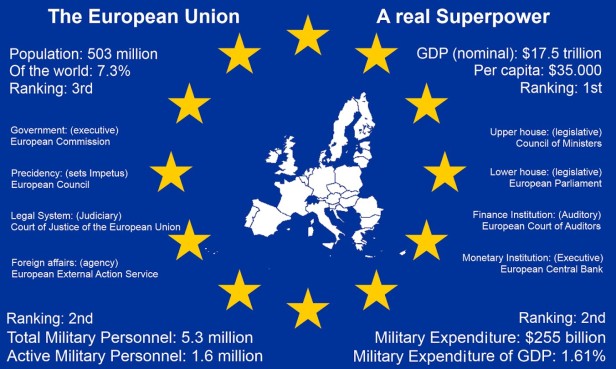
Either way, it’s bad for both Americans and Europeans. It creates conflicts where today there are none, and it creates the potential for world-devastating wars that are right now impossible.
Trump is right about one thing: NATO is somewhat obsolete, but only because it doesn’t include Russia.
Founded as an anti-Soviet alliance, the collapse of the USSR deprived NATO of its most public purpose. But securing Europe from itself was also a vital part of its mission.
Communist conquest used to loom over the alliance, but that’s no longer a problem. Now, NATO seeks to end violent geopolitics on a continent that had honed it to a world-shuddering art form.
Yet Russia is both continentally and geopolitically a European power. NATO without Russia fails to secure Europe, and so in that matter it does need an update.
Imagine Russia in NATO as early as 1995. Part of the American-led order, Europe is entirely secured: holdouts like Belarus, Moldavia, and Serbia know they must adapt or be strangled. China’s northern flank goes from a gray neutral to a dark blue NATO, with Russian and U.S. air forces patrolling the Far East. This would put paid to any long-term Chinese hopes to ever dominate or control the Far East’s vast resource base.
But Russia today distrusts and fears NATO, especially its values-based foreign policy, which promotes democracy, Western liberal views of human rights, and Western views of governance. There are compelling reasons for Putin to fear all of that: too much democracy might be lethal to the Russian Federation, as it sits atop an unsteady czarist foundation. Russia is a Russian-dominated federation, but a federation it truly is: minority ethnic groups might, given the opportunity to vote on it, force Russia to endure yet another round of secession.
Meanwhile, Vladimir Putin has staked his career on that very fear.
Putin is a Cold Warrior in every sense of the word. Cutting his teeth as a KGB agent in East Germany, he witnessed the greatest geopolitical rollback since World War II. He has concluded that NATO aims to humiliate and destroy Russia, not to embrace it as a partner.
He is wrong. NATO’s leadership is naive, not nefarious. NATO absolutely aimed to destroy the USSR: that was its purpose. But until 9/11, NATO’s elites, especially in Europe, really did believe the world had become a kinder, gentler place, ready for planetary liberal democracy. NATO’s purpose was values-based: protect human rights, save innocent people. It was under this banner that NATO bombed Serbia during the Kosovo war in 1999.
After 9/11, NATO’s elites understood that Sunni supremacist terrorism posed a threat, though not an existential one, to the alliance. But they did not see Russia as a major threat until the Crimean invasion in 2014. It took, in other words, three wars – Chechnya in 1999-2000, Georgia in 2008, and Ukraine in 2014, in addition to numerous assassinations of anti-Putin dissidents – to convince NATO as a whole that Putin was a geopolitical rival, not an ally-in-waiting.
Sadly, he is not wrong in his calculation that to join NATO will mean the end of Russia as a great independent power. It will place it firmly in the same category as Germany, France, and the UK: a once-great, junior partner to the military aegis of the United States. For elites like him, who above all things seek their own power, that is a political death sentence. Few Russian elites, military and civilian, are ready to accept that loss under NATO’s flag.
Trump is also wrong about NATO and terrorism.
What does Trump mean when he says NATO “change its focus” against terrorism? (I know, I know, what the hell does he mean when he says anything?) If he’s implying NATO should be carpet bombing more villages, that’s a tried and failed strategy, as we learned during Operation Rolling Thunder in the Vietnam War. If he’s implying NATO should dump troops into the Middle East to stop Sunni supremacist terror, he’s asking for a war effort that could include occupations of Yemen, Libya, Syria, Iraq, Somalia, Nigeria, and of course Afghanistan, just to name the overt bases of Sunni supremacism.
This is a Bush administration-era mistake. Traumatizing terrorism though can be, it is not – yet – a major geopolitical threat to any Western nation-state. Sunni supremacism, whether in the guise of the Taliban, al-Qaeda, or the Islamic State, has yet to gain the kind of ground we should deploy vast armies to stop. Slopping military power onto the Middle East, killing many and hoping the Lord sorts them out, is a misuse of precious resources and, more importantly, won’t work.
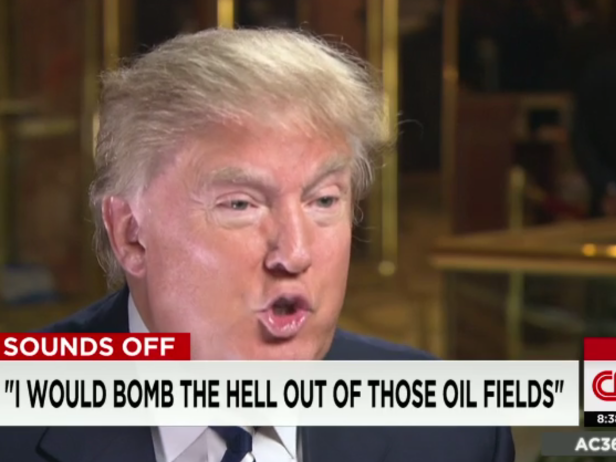
Such an approach will absolutely undermine the states the West needs to fight Sunni supremacism: from Morocco to Pakistan, no standing Muslim state wants to lose power to al-Qaeda or the Islamic State, and all are determined to fight it and its ideological fellow travelers. Even the Saudi monarchy, inept though it is in combating the roots of terror, is able to bring out a hammer to crush Sunni supremacism militancy, as it did during the al-Qaeda revolt of 2003-05.
Bombing “the shit” out of the Muslim world will almost surely weaken or even collapse those states. There is no democratic cabal waiting to take their place: we have seen their replacements, and they are butchers with black flags.
Looks like America is about repeat all the same mistakes of the Bush years.
If General Mattis, the only true professional in Trump’s national security cabinet thus far, can dominate the conversation, it may be that Trump’s ill-conceived complaints go nowhere. But the United States is dangerously close to repeating all errors of the Bush years: alienating important allies with conservative base-pleasing nonsense, overusing the military to solve what are really police matters, and undermining friends while giving cheap propaganda to friends.
Obama spent eight years trying to conserve American power. Trump sounds like he wants to use it all up in one go, crumbling an already fragile Middle East as he bludgeons a handful of Sunni supremacist militants, while even more disastrously encouraging the continental birthplace of world war to fashion swords from plowshares.
No matter your international politics, none of that is cause for celebration.
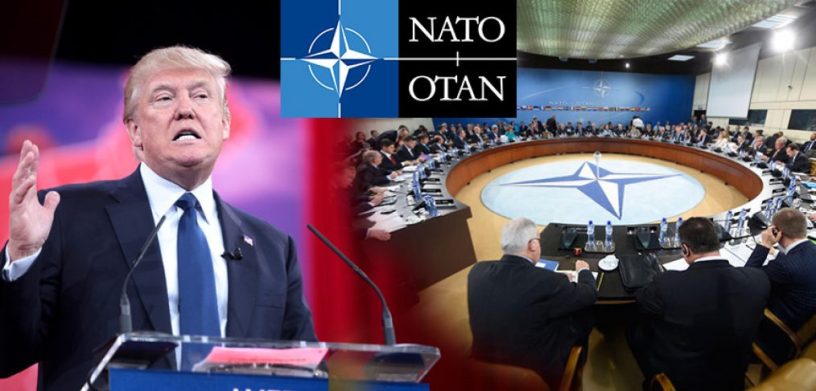
I really dislike being a stereotypical Serb, but all you need is to look at Kosovo since 1999 to understand what kind of monsters’ side you took back then. Also, calling us a Russian holdout is downright offensive and wrong.
Thanks very much for your feedback. I’ve gone ahead and edited the article for clarity, rewriting that it’d be better to imagine Russia in NATO in the 1990s, when Serbia’s Milosevic regime was in power. Serbia has come a very long way since then: its democratic credentials are strong, and while it remains a potential thorn in NATO’s side as a possible ally of Moscow, it no longer abuses human rights as during the 1990s. The KLA’s human rights record is obviously not great either, though if we are to go body-for-body, the Milosevic era doubtless buried more.